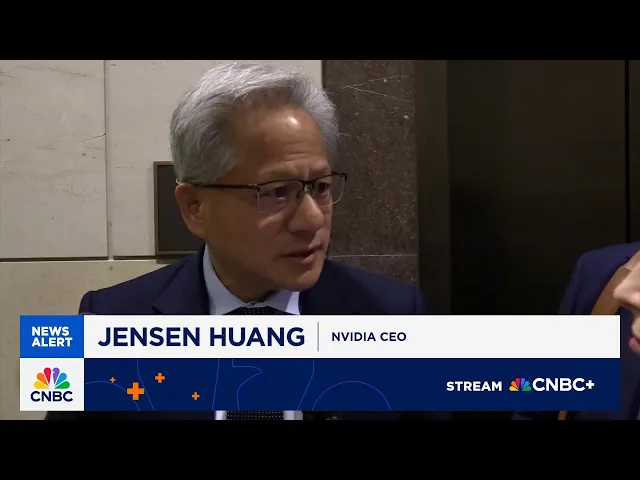Jensen Huang: China is not behind the U.S. in AI development

US and China: the infinite AI race
In a world obsessed with technological dominance, NVIDIA CEO Jensen Huang delivered a sobering reality check on Capitol Hill this week. Speaking candidly with reporters between meetings with lawmakers and White House officials, Huang offered a rare glimpse into how one of tech's most influential leaders views the increasingly tense AI competition between the United States and China.
Key insights from Huang's comments:
- China is "not behind anybody" in AI development — Huang explicitly stated the competition is extremely close, challenging the common American narrative of technological superiority
- The AI race is "infinite" with no finish line — Unlike quarterly business cycles, Huang emphasized this is a long-term competition requiring sustained investment and focus
- China possesses formidable technical capabilities — He specifically noted that 50% of the world's AI researchers are Chinese, highlighting their deep talent pool
- Manufacturing onshore is possible but requires more than just tariffs — Huang stressed the need for comprehensive policies that genuinely support domestic production
The infinite race perspective changes everything
Perhaps Huang's most insightful observation was framing AI competition as an "infinite race." This fundamentally reorients how we should approach national AI strategy. The typical American business mindset—quarterly results, quick wins, and decisive victories—simply doesn't apply here.
This matters enormously because it suggests our current policy approaches may be fundamentally misaligned with the nature of the challenge. Short-term trade restrictions or reactionary policies fail to address the systemic investments needed for truly sustainable AI leadership. When Huang says "there's no two-minute, end-of-the-quarter" in this competition, he's implicitly critiquing America's tendency toward short-termism in both business and policy.
The broader context business leaders should understand
NVIDIA itself embodies this tension between national interests and global business realities. As the dominant provider of AI chips worldwide, NVIDIA faced significant financial impacts when the U.S. restricted high-end chip exports to China last year. The company took a substantial write-down as a result—an immediate business consequence of geopolitical positioning.
What's particularly striking is how this dynamic challenges traditional concepts of national competitive advantage. Unlike previous technological revolutions where physical resources or manufacturing scale determined winners, AI
Recent Videos
How To Earn MONEY With Images (No Bullsh*t)
Smart earnings from your image collection In today's digital economy, passive income streams have become increasingly accessible to creators with various skill sets. A recent YouTube video cuts through the hype to explore legitimate ways photographers, designers, and even casual smartphone users can monetize their image collections. The strategies outlined don't rely on unrealistic promises or complicated schemes—instead, they focus on established marketplaces with proven revenue potential for image creators. Key Points Stock photography platforms like Shutterstock, Adobe Stock, and Getty Images remain viable income sources when you understand their specific requirements and optimize your submissions accordingly. Specialized marketplaces focusing...
Oct 3, 2025New SHAPE SHIFTING AI Robot Is Freaking People Out
Liquid robots will change everything In the quiet labs of Carnegie Mellon University, scientists have created something that feels plucked from science fiction—a magnetic slime robot that can transform between liquid and solid states, slipping through tight spaces before reassembling on the other side. This technology, showcased in a recent YouTube video, represents a significant leap beyond traditional robotics into a realm where machines mimic not just animal movements, but their fundamental physical properties. While the internet might be buzzing with dystopian concerns about "shape-shifting terminators," the reality offers far more promising applications that could revolutionize medicine, rescue operations, and...
Oct 3, 2025How To Do Homeless AI Tiktok Trend (Tiktok Homeless AI Tutorial)
AI homeless trend raises ethical concerns In an era where social media trends evolve faster than we can comprehend them, TikTok's "homeless AI" trend has sparked both creative engagement and serious ethical questions. The trend, which involves using AI to transform ordinary photos into images depicting homelessness, has rapidly gained traction across the platform, with creators eagerly jumping on board to showcase their digital transformations. While the technical process is relatively straightforward, the implications of digitally "becoming homeless" for entertainment deserve careful consideration. The video tutorial provides a step-by-step guide on creating these AI-generated images, explaining how users can transform...
